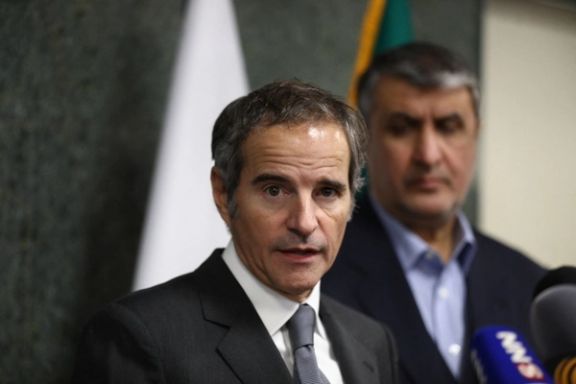UN Nuclear Chief Calls For ‘Cooperation’ In Reviving Iran Deal

The head of the United Nations nuclear body has said “political circumstance” must be overcome if UN monitoring of the Iran nuclear program is to be effective.

The head of the United Nations nuclear body has said “political circumstance” must be overcome if UN monitoring of the Iran nuclear program is to be effective.
In an interview Wednesday with Associated Press (AP), Rafael Mariano Grossi, head of the International Atomic Energy Agency, stressed the agency’s continuing work both in inspecting Iranian atomic facilities and in pursuing answers over its past nuclear work.
“There are certain things they need to explain that are not very clear to us,” Grossi said, referring to work carried out by Iran before 2003 in sites where the IAEA later detected traces of uranium. Tehran is due to satisfy the agency’s concerns by June 21.
Grossi referred to Iran’s recent transfer of nuclear manufacturing from Karaj, west of Tehran, to Natanz as a shift to “a place where they feel they are more protected.” The Karaj workshop, which made parts for centrifuges used to enrich uranium, was sabotaged in June 2021 in an attack widely attributed to Israel.
Grossi noted that the new manufacturing plant at Natanz also reflected growth in Iran’s nuclear program. “The activity is not new, but the production lines, the production capacities, are being expanded,” he said.
While the IAEA is not directly involved in Vienna talks to revive the 2015 Iran nuclear agreement, the JCPOA (Joint Comprehensive Plan of Action), Grossi has made clear the agreement’s demise − following United States 2018 withdrawal and Iran’s 2019 decision to reduce IAEA access and break JCPOA limits − has undermined the agency’s monitoring role.
Grossi told AP that the real value of a temporary access arrangement in place since February 2021 would be realized only if the JCPOA were back in place, when the agency would be able to retrieve all data in its monitoring equipment, including cameras, in Iran’s nuclear sites.
‘Not easy'
"Well, you know, that access to information is part of an understanding I have with Iran that has it, that once the JCPOA is back in application, then they are going to be releasing this material to us,” Grossi said. “So, if JCPOA negotiations were to fail and I don't want to imagine that, but it's a possibility. Then I have to sit down with my Iranian counterparts and look into this again."
The IAEA chief, whose time since taking office December 2019, has been dominated by Iran, conceded that “putting every effort into making this process a success…is not easy.”
Among the issues stalling year-long Vienna talks to revive the JCPOA is reportedly the US 2019 listing of Iran’s Revolutionary Guards (IRGC) as a ‘foreign terrorist organization.’
“There is a political circumstance surrounding this whole thing,” he noted. “And I do not exclude that Iran and others are, of course, looking peripherally at what is going on elsewhere and measuring their reactions to this. My job is to focus on this, to insist, to be very inquisitive in our questioning, to try to get to a clarification. And I'm sure that this will help if we get there. If we don't, there could be further complications. So, I hope this is incentive enough for people to cooperate."